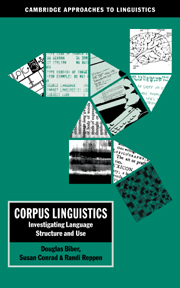Book contents
- Frontmatter
- Contents
- Preface
- 1 Introduction: goals and methods of the corpus-based approach
- Part I Investigating the use of language features
- 2 Lexicography
- 3 Grammar
- 4 Lexico-grammar
- 5 The study of discourse characteristics
- Part II Investigating the characteristics of varietie
- Part III Summing up and looking ahead
- Part IV Methodology boxes
- Appendix: commercially available corpora and analytical tools
- References
- Index
3 - Grammar
Published online by Cambridge University Press: 05 June 2012
- Frontmatter
- Contents
- Preface
- 1 Introduction: goals and methods of the corpus-based approach
- Part I Investigating the use of language features
- 2 Lexicography
- 3 Grammar
- 4 Lexico-grammar
- 5 The study of discourse characteristics
- Part II Investigating the characteristics of varietie
- Part III Summing up and looking ahead
- Part IV Methodology boxes
- Appendix: commercially available corpora and analytical tools
- References
- Index
Summary
The study of grammar
The study of grammar is concerned with understanding the structure of a language, including: morphology – the structure of words; syntax – the way words are arranged into sentences; and other properties of words, such as their grammatical classes (e.g., nouns, verbs, adjectives).
Unlike lexicography, grammar does not have a long tradition of empirical study. Until recently, little attention was given to studying how native speakers actually exploit the grammatical resources in their language. Instead, interest in grammar typically has had one of three major concerns.
First, the study of grammar is often seen as a prescriptive enterprise, itemizing the grammatical rules required for “correct” speech. Rules such as “Don't end a sentence with a preposition” and “Be consistent in the use of tense throughout a sentence” are prescriptive rules that many students associate with English grammar.
Within linguistics, though, grammatical studies are almost always descriptive rather than prescriptive. Traditionally, grammatical studies had the goal of providing a relatively complete catalog of the forms in a language and a description of the rules for combining forms. A grammar of this type would typically describe the full range of morphological forms, including inflectional morphology (e.g., marking person or tense for verbs, or marking number or case relations for nouns) and derivational morphology (e.g., the morphological processes for turning verbs into nouns). Descriptive grammars would also describe the ways that words are combined into clauses and sentences, focusing on word order and various kinds of subordination.
- Type
- Chapter
- Information
- Corpus LinguisticsInvestigating Language Structure and Use, pp. 55 - 83Publisher: Cambridge University PressPrint publication year: 1998



